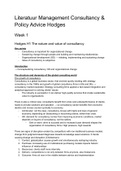Samenvatting
Samenvatting boek Hodges voor Management Consultancy & Policy Advice EUR
- Instelling
- Erasmus Universiteit Rotterdam (EUR)
Samenvatting van alle verplichte hoofdstukken uit het boek Consultancy, Organizational Development and Change A Practical Guide to Delivering Value van Hodges. Voor Management Consultancy & Policy Advice BA3 Bestuurskunde en MISOC, Erasmus Universiteit. Gegeven door Karre en Voorberg
[Meer zien]





